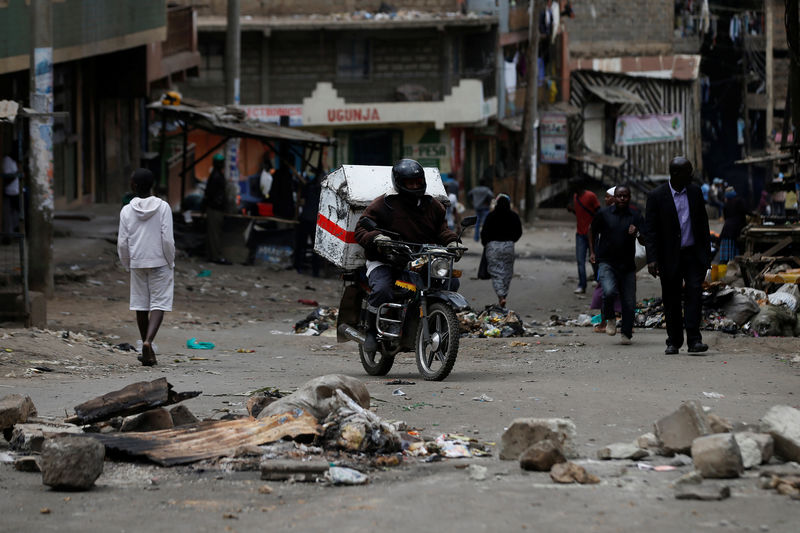By Ed Cropley and George Ng'ang'a
NAIROBI (Reuters) - Kenya's opposition called on people to stay away from work on Monday in protest at last week's declared election result, but response to the call was limited with many businesses re-opening after being closed during the tense election period.
Many shops opened up again in the capital, Nairobi, and in the western town of Kisumu for the first time in days, and cars and buses were moving around on streets that had been deserted even before the result was announced of the Aug. 8 presidential election.
In Kibera, Nairobi's biggest slum where opposition support is strong, minibuses and taxis were also plying their trade through the rubble-strewn streets, and some food stalls and phone and money outlets opened their doors.
But residents there said most people were observing the opposition's call to stay away from work in protest over the vote which it says was rigged.
The election commission declared President Uhuru Kenyatta winner by 1.4 million votes. International observers said the vote was largely fair and a parallel tally by domestic monitors supported the outcome.
But protests erupted in opposition-supporting pockets of Nairobi and in Kisumu, where defeated opposition leader Raila Odinga has strong support.
Kenya is the economic motor of East Africa but most of its 45 million population rely on informal work to make ends meet.
Ken Nabwere, a Nairobi resident, said he had little choice but to return to work after days of inactivity even though he supported the opposition National Super Alliance (NASA) coalition which called the strike.
"I was supposed to vote and (leave) the rest to the politicians because if I was to boycott work today those guys don’t pay my bills," he told Reuters.
"I would advise others that unless you have permission from your boss, then you better go to work," he said.
"NASA is not going to pay for our bills, I don't think it's a good move to tell people not to go to work actually ... we have been out of business for us for one week," said university lecturer Samuel Mukoma.
"I think they should tell people, to go back to work and wait for their next move," he added.
Election commission figures showed Kenyatta won 54.3 percent of the vote, ahead of Odinga on 44.7 percent. Nearly 80 percent of the 19 million registered voters cast their ballots.
Though Odinga says the vote was fraudulent, his NASA coalition has ruled out going to court and says it will announce its strategy on Tuesday.
A Kenyan human rights group said 24 people were shot dead by police in the violence. The police have put the number of dead at six and said those killed were armed criminals who attacked officers who were attempting to arrest them.
The Kenya Red Cross said on Saturday it had treated 93 injured people.
Many in the Kibera quarter of Nairobi were backing NASA'S strike call. "It's only a small portion of people who are working. People need food and money," said 32-year-old community health volunteer Thomas Ogoni.
Business activity had largely resumed in Kisumu, with some supermarkets open and motorcycle taxi operators out and about.
But opposition supporters said they remained determined to overturn the result.
"Even if we don't work for one or two months, no problem. God will help our families survive, said Frederick Olando, a 34-year-old father of three in the western city of Kisumu. "We voted and we have to get our rights."
